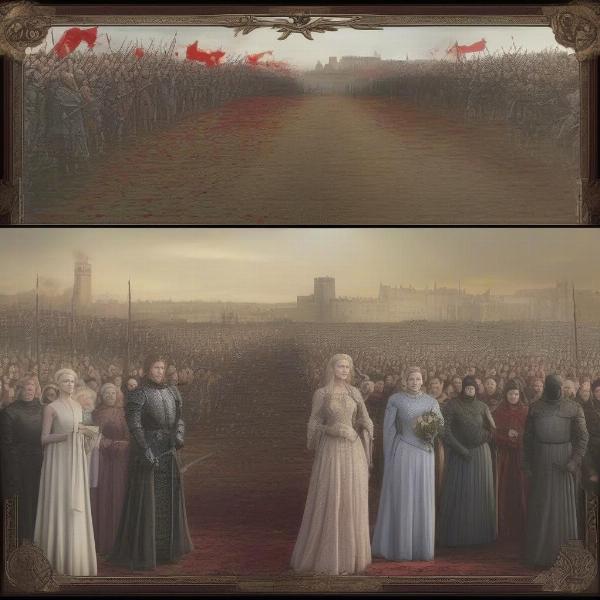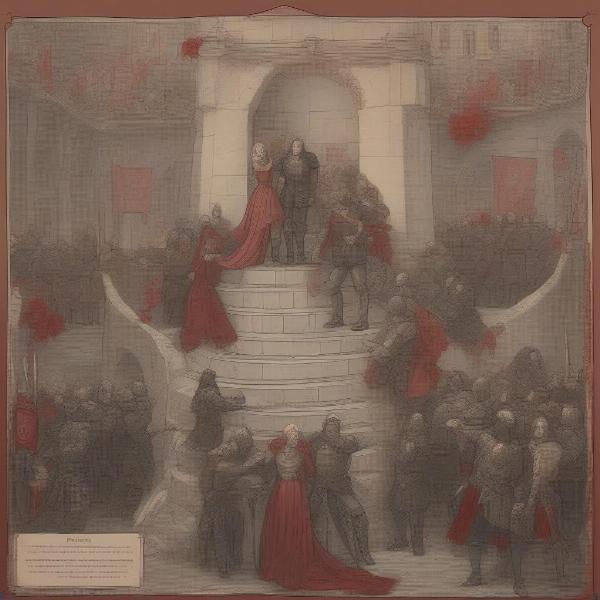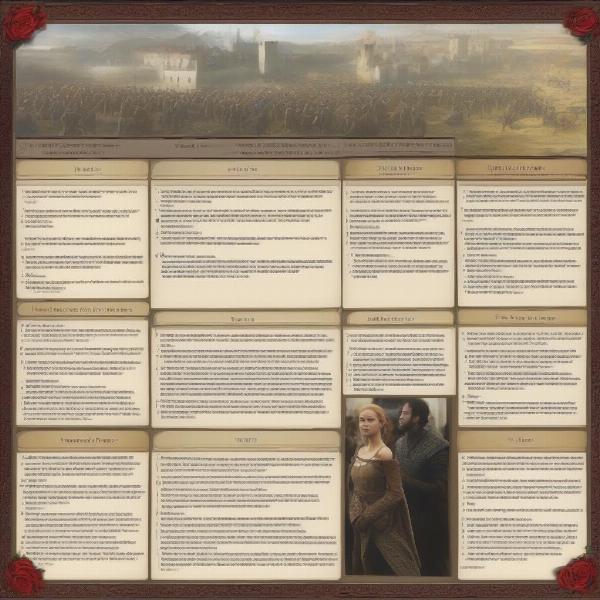At SupremeDuelist.blog, we delve into the intriguing intersections of history and popular culture. Today, we’re exploring the captivating similarities between the War of the Roses and the Game of Thrones. These are more than mere coincidences; they reveal how history often provides the most compelling narratives. This article examines the historical roots and the fictional portrayals of power struggles, treachery, and dynastic ambitions, uncovering the layers of inspiration for George R.R. Martin’s epic saga.
The Historical Roots of Westeros: Unveiling the War of the Roses
The War of the Roses is a series of English civil wars fought between the Houses of Lancaster and York, both cadet branches of the Plantagenet dynasty. This conflict, spanning from 1455 to 1487, wasn’t just about crowns; it was a brutal struggle for power, land, and influence. This period of English history is ripe with tales of shifting allegiances, shocking betrayals, and devastating battles—all of which resonate strongly within the narrative of Game of Thrones. The intense family feuds, the political maneuvering, and the sheer ruthlessness on display are all hallmarks of both the real war and the fictional one.
 Historical Parallels in Game of Thrones and War of the Roses
Historical Parallels in Game of Thrones and War of the Roses
Key Figures and Their Fictional Counterparts
Just as Game of Thrones boasts complex and morally grey characters, the War of the Roses featured a cast of equally complicated individuals. For instance, the ruthless ambition of Margaret of Anjou, the wife of Henry VI, finds parallels in Cersei Lannister’s relentless quest for power. Similarly, the popular and powerful Edward IV, with his military prowess and kingly charm, mirrors figures like Robert Baratheon. The complex dynamics between these real historical figures often play out in interesting ways within the narratives of Game of Thrones. The series takes key elements and traits of historical figures and weaves them into its own tapestry, giving readers and viewers a sense of both familiar reality and fresh fantasy. The intricate web of relationships and backstabbing betrayals form the heart of both stories. Exploring this connection between history and fantasy allows us to appreciate the depth of George R.R. Martin’s work and his understanding of human nature. To further delve into comparisons within epic fantasy narratives, you can explore star wars vs game of thrones and gain a deeper perspective on the evolution of storytelling across diverse mediums.
The Importance of Dynastic Disputes
The core of both the War of the Roses and Game of Thrones is the question of rightful succession. In the English civil wars, the conflict revolved around claims to the throne based on lineage and marriages, which led to the constant shifting of power. Similarly, in Game of Thrones, the death of King Robert Baratheon throws the Seven Kingdoms into chaos, with multiple claimants vying for control, each supported by varying degrees of legitimacy and ruthlessness. These dynastic disputes aren’t just plot devices; they are central themes that drive the action and explore the consequences of ambition, corruption, and the desperate need for power. The instability created by these disputes allows for all kinds of characters to make power grabs, testing the moral fabric of individuals and entire societies.
The Fictional Echoes in Game of Thrones
While not a direct retelling, Game of Thrones borrows heavily from the historical period, capturing the spirit of the War of the Roses while building its own unique world. The series provides a fictional backdrop with dragons and magic, but the human element of political intrigue and family feuds remains the same. The show’s adaptation of historical themes helps ground the fantasy within something that feels relatable.
Political Intrigue and Betrayal
The constant backstabbing and strategic alliances in Game of Thrones mirror the political landscape of the War of the Roses. Characters like Littlefinger and Varys, who skillfully manipulate others to their own advantage, embody the spirit of the many power-hungry nobles who played both sides of the conflict in the historical period. This element of unpredictability and shifting alliances makes both narratives compelling and unpredictable. No character is safe, and each victory and loss has deep implications for the wider political landscape. The way people try to gain power at the expense of others is a running theme in both stories, showing how such actions can cause chaos and turmoil for a long time to come.
 Political Intrigue and Betrayal in Game of Thrones
Political Intrigue and Betrayal in Game of Thrones
The Brutality of War and the Cost of Power
Both the War of the Roses and Game of Thrones do not shy away from depicting the brutal realities of warfare. The battles are bloody, the consequences are far-reaching, and the casualties are devastating. This focus on the cost of war, not only in terms of lives but also in terms of the moral erosion of society, is a significant aspect of both stories. In Game of Thrones, the wars leave Westeros a broken land, just as the Wars of the Roses left a lasting scar on England, leading to the Tudor dynasty. To fully appreciate the scope and consequences of conflicts across different narratives, it can be helpful to consider star wars vs game of thrones as well. It offers a contrasting perspective on the way conflict can drive the plot and shape the fates of characters.
The Question of Leadership
The two narratives also present interesting insights into the nature of leadership. The War of the Roses showcases a succession of weak and flawed kings, often manipulated by stronger personalities. Game of Thrones also has its share of flawed leaders, making the reader or viewer question whether any kind of good rule can exist in such a corrupt world. This theme of what makes a good leader, and the costs of bad leadership, ties into the larger idea of power and how it affects those who wield it. This focus on leadership is a central question in both narratives, asking what the consequences are when flawed people obtain and wield so much power.
“History often repeats itself, not as an exact copy, but as echoes and reflections,” notes Dr. Eleanor Vance, a historian specializing in medieval political conflict. “The parallels between the War of the Roses and Game of Thrones illustrate how these themes of power, ambition, and betrayal are timeless.”
Frequently Asked Questions about War of the Roses and Game of Thrones
What was the War of the Roses?
The War of the Roses was a series of civil wars in 15th century England between the Houses of Lancaster and York, both vying for the throne. These wars involved complex alliances, betrayals, and brutal battles, shaping the political landscape of the era.
Who were the key players in the War of the Roses?
Key figures included the ambitious Margaret of Anjou, the king Edward IV, and the ill-fated Richard III, along with powerful nobles like the Earl of Warwick, known as the “Kingmaker,” who shifted allegiances.
How does Game of Thrones relate to the War of the Roses?
Game of Thrones draws inspiration from the War of the Roses in terms of its intricate political struggles, dynastic disputes, betrayals, and brutal battles, while adding fantasy elements like dragons and magic to the overall narrative.
What are the main themes shared by both?
The main themes include the destructive nature of ambition, the instability of power, the consequences of betrayal, and the brutal realities of war, with an underlying exploration of the role of leadership.
Are any characters directly based on historical figures?
Characters such as Cersei Lannister (Margaret of Anjou) and Robert Baratheon (Edward IV) have parallels with figures from the War of the Roses, but they are not direct copies. Instead, their personalities, actions and power struggles are adapted from historical patterns and events.
 Game of Thrones and War of the Roses Comparison Table
Game of Thrones and War of the Roses Comparison Table
Why is the War of the Roses still relevant today?
The War of the Roses is still relevant today because it is a compelling example of the destructive nature of political conflict and the constant struggle for power. The issues of succession, alliances, and betrayal remain timeless human dramas. It also demonstrates how history can be used to understand present day political structures and power dynamics.
“The brilliance of George R.R. Martin is that he didn’t just retell history, he reimagined it, making it relevant and compelling for a modern audience,” states Professor Liam O’Connell, a media studies expert. “The underlying themes are universal, and that is why Game of Thrones continues to resonate with so many.”
Conclusion
The striking similarities between the War of the Roses and Game of Thrones reveal how history can serve as a powerful source of inspiration. The tales of ambition, treachery, and power struggles in both narratives are not just entertaining; they are insightful explorations of human nature. At SupremeDuelist.blog, we appreciate the way storytelling can bridge the gaps between history and imagination, and this connection provides a valuable window into the complexities of human conflict. If you’ve enjoyed this analysis and want to delve deeper into more fascinating interconnections of storytelling, be sure to explore our other articles.
Leave a Reply